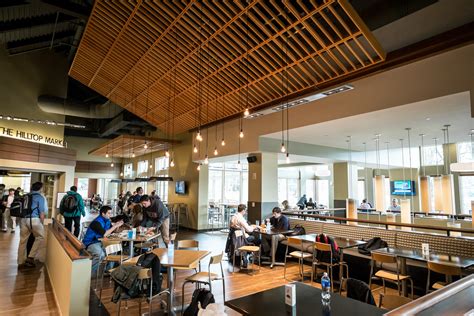Indulge in a World of Flavors at WFU

Wake Forest University’s campus dining program prides itself on delivering an exceptional culinary experience that caters to the diverse tastes and dietary needs of its vibrant student population. With a wide selection of dining venues, meal plans tailored to individual preferences, and a commitment to sustainability, WFU’s dining services aim to nourish and delight students while contributing to a vibrant campus community.
Dining Venues: A Symphony of Cuisines
- Pitts Dining Hall: The university’s main dining hall offers an extensive buffet-style spread, featuring a rotating menu of international cuisine, classic American dishes, and made-to-order specialties.
- Manchester Village Market: This modern food court-style venue houses a variety of food stations serving everything from pizzas and burgers to salads, sandwiches, and Asian-inspired delicacies.
- One Earth Cafe: Focused on sustainability, this cafe presents plant-based options, organic ingredients, and ethically sourced coffee and pastries.
- The Bridge Coffee Shop: This cozy spot serves Starbucks coffee, a selection of teas, and baked goods, providing students with a welcoming space to study, socialize, or simply relax.
Meal Plans: Flexibility at Your Fingertips
WFU offers a range of meal plans to suit the diverse dining habits of students. From the unlimited “All-Access Plan” to the customizable “Flex Plan,” students can choose a plan that aligns with their needs and budget.
- All-Access Plan: This comprehensive plan provides unlimited access to all dining halls and on-campus food venues for a fixed cost each semester.
- Flex Plan: A flexible option that allows students to purchase a set number of meals or dining dollars, which can be used at any campus dining facility.
- Block Plan: A value-oriented option that offers a discounted amount of dining dollars that can be used over a set period of time.
Commitment to Sustainability: Nourishing the Planet
WFU’s campus dining program is deeply committed to sustainability, implementing innovative initiatives to reduce waste, promote local sourcing, and protect the environment.
- Food Waste Reduction: WFU has partnered with the Food Recovery Network to donate surplus food to local organizations, diverting it from landfills and feeding those in need.
- Sustainable Sourcing: The university prioritizes purchasing ingredients from local farmers and suppliers, supporting the community and reducing carbon emissions associated with long-distance transportation.
- Compostable Packaging: WFU has transitioned to using compostable packaging in many of its dining facilities, minimizing the university’s environmental impact.
Benefits of Campus Dining at WFU:
- Convenience: With on-campus dining venues conveniently located throughout campus, students can easily access nutritious and affordable food options.
- Nutrition and Well-being: WFU’s dining program offers a wide variety of healthy choices, including vegan, vegetarian, and gluten-free options, ensuring that students receive the nourishment they need to thrive.
- Socialization and Engagement: Campus dining venues serve as vibrant social hubs, providing students with opportunities to connect with peers, build relationships, and create lasting memories.
- Flexible Dining Options: With multiple meal plans and dining options available, students can tailor their dining experience to suit their individual preferences and dietary needs.
Customer Testimonials:
“WFU’s dining program is exceptional. The food is always fresh and delicious, and there’s something to satisfy every craving.” – Emily, sophomore
“I love the flexibility of the meal plans. I can choose the plan that works best for my budget and eating habits.” – John, junior
“The commitment to sustainability is really impressive. I feel good about dining on campus knowing that I’m supporting local businesses and reducing my environmental impact.” – Sarah, senior
Effective Strategies for Campus Dining:
- Diversify Dining Options: Offer a wide variety of cuisines, including vegan, vegetarian, and gluten-free options, to cater to diverse dietary needs.
- Implement Technology: Utilize online ordering, mobile apps, and self-service kiosks to streamline the dining experience and reduce wait times.
- Focus on Sustainability: Implement sustainable practices such as food waste reduction, composting, and responsibly sourced ingredients.
- Engage Students: Involve students in dining decision-making, gather feedback, and create dining initiatives that address their needs.
The Future of Campus Dining: A Culinary Evolution
As technology and dining trends continue to evolve, WFU’s campus dining program is poised to embrace innovation and adapt to the changing needs of students.
- Personalized Dining Experiences: Artificial intelligence and machine learning can be leveraged to personalize the dining experience, creating tailored menu recommendations and offering targeted promotions.
- Virtual Dining: Virtual reality and augmented reality technologies could enhance the dining experience by providing virtual tours of dining halls, immersive food preparation demonstrations, and interactive cooking classes.
- Sustainability at the Forefront: Campus dining programs will play a critical role in promoting sustainability, exploring innovative solutions for reducing food waste, promoting ethical sourcing, and minimizing environmental impact.
Conclusion:
Wake Forest University’s campus dining program is a vibrant and dynamic culinary hub that nourishes the bodies and spirits of its students. With its diverse dining venues, flexible meal plans, and commitment to sustainability, WFU’s dining services contribute to the university’s vibrant campus culture and provide students with an exceptional dining experience. As the future of campus dining unfolds, WFU will continue to innovate and adapt, embracing new technologies and embracing the ever-changing needs of its student population.
